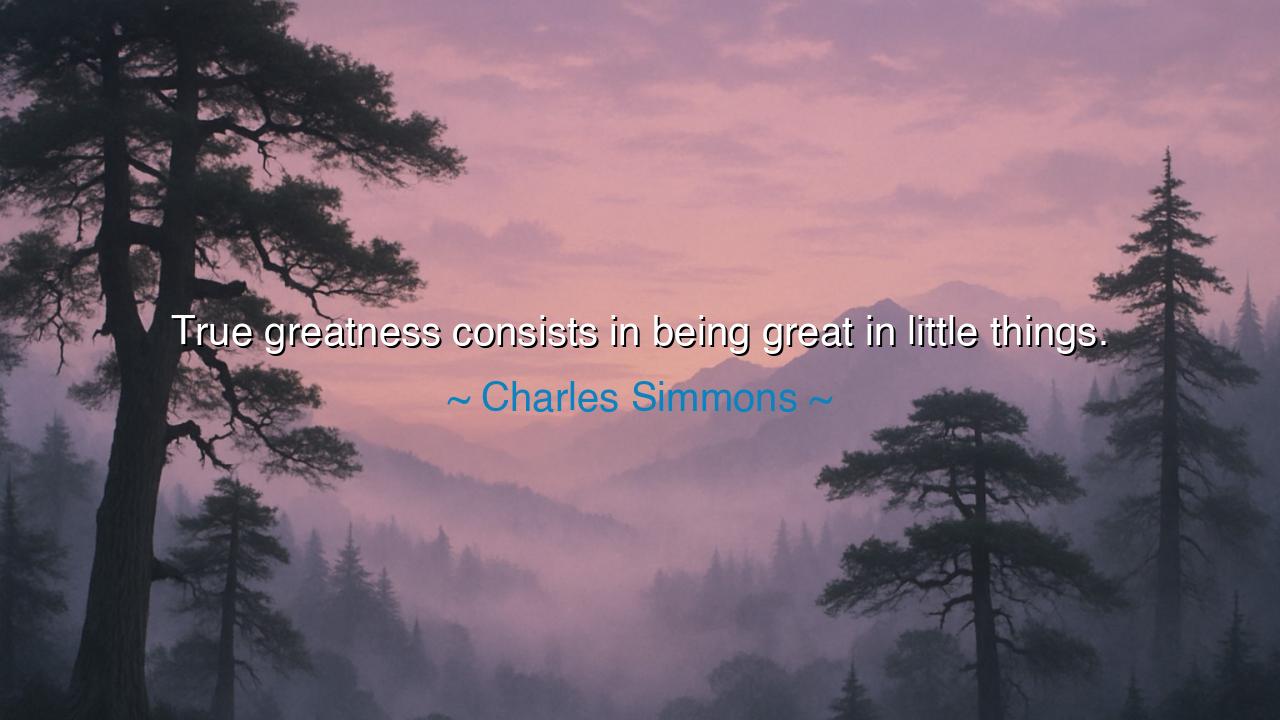
True greatness consists in being great in little things.






“True greatness consists in being great in little things.” Thus spoke Charles Simmons, a philosopher and preacher of the 19th century, whose words carry a wisdom as timeless as the stars. In this simple yet profound truth, he reveals the secret of character, the essence of virtue, and the path to enduring greatness. For the measure of a soul, he reminds us, lies not in grand gestures or fleeting triumphs, but in the quiet moments — in how one conducts the ordinary acts of life. To be great in little things is to make excellence a habit, to bring care, sincerity, and integrity into even the smallest deeds. It is the mastery of self, not the conquest of the world, that defines the truly noble spirit.
The ancients knew this well. They taught that the universe itself is sustained not by grand forces alone, but by harmony among the smallest elements — the grain of sand, the drop of water, the atom of light. So too with humanity: the greatness of an empire rests upon the honesty of its citizens, the strength of a family upon the kindness of its members, and the honor of a person upon the smallest of their actions when no one watches. To be “great in little things” is to live with attention, to act as though each moment were sacred, and each choice, however small, were a thread in the vast tapestry of destiny.
Consider the life of Mahatma Gandhi, who shook an empire not with armies, but with steadfast adherence to truth in the smallest details of living. His greatness was not found in power or wealth, but in the discipline of his daily acts — in how he spun his own cloth, ate humbly, and spoke with compassion even to his enemies. Gandhi understood that the world is changed not by grand speeches, but by the quiet consistency of moral courage. He was great in little things, and through them, he became great in all. His example reminds us that to reform the world, one must first reform the self — and that begins in the unseen, the ordinary, the everyday.
So often, people seek greatness in what dazzles — in fame, in victory, in monuments that bear their names. But these are shadows of true glory. The mighty who scorn the small things soon crumble, for without humility, their greatness is hollow. The wise know that to build a mighty temple, one must first lay each stone with care. A soldier’s bravery is proven not only on the battlefield, but in his patience during peace. A leader’s worth is shown not only in triumph, but in how he listens, how he treats the least of those around him. Greatness, like light, is revealed most clearly in the small spaces of life.
Even in nature, we see the same truth. The tallest mountain begins as dust; the mightiest river is born of drops of rain. The oak, whose roots clutch the earth with strength, was once a seed — small, silent, and unseen. So it is with human virtue. Patience, honesty, and kindness, practiced daily in small measures, grow into greatness that no crown can bestow. It is not the single act of heroism, but the daily habit of goodness that makes a life noble. The great soul is one who shines in obscurity, who honors duty when no eyes applaud, who chooses right over convenience in the smallest of crossroads.
History teaches this again and again. Florence Nightingale, tending to soldiers in the dim wards of the Crimean War, did not seek fame; she sought to do one small act of mercy at a time. Yet those acts changed the face of medicine and compassion. Mother Teresa, caring for one dying person after another, showed that love, when poured into the smallest deeds, becomes boundless. These were not conquerors of lands, but conquerors of self — women who proved that greatness begins in the smallest acts of service and devotion.
So, my friend, let this be your lesson: seek not greatness in the distant horizon, but in the step before you. Perform the little things with care, with reverence, with love. Keep your promises. Speak truth even when it seems trivial. Do your work well, not for reward, but for the sake of excellence itself. The habit of being great in small matters will make you steadfast when great challenges come. For the soul that is faithful in little things cannot fail when fate demands much.
Remember always what Charles Simmons taught: that true greatness does not begin with power or fortune, but with the quiet mastery of the self. It is born in moments of honesty, humility, and kindness — in the way you speak, the way you serve, the way you honor even the smallest duties of life. Be great, not in the eyes of the world, but in the truth of your own heart. For when you learn to be great in little things, you carry within you a greatness that time cannot erode, and that eternity itself will remember.






AAdministratorAdministrator
Welcome, honored guests. Please leave a comment, we will respond soon